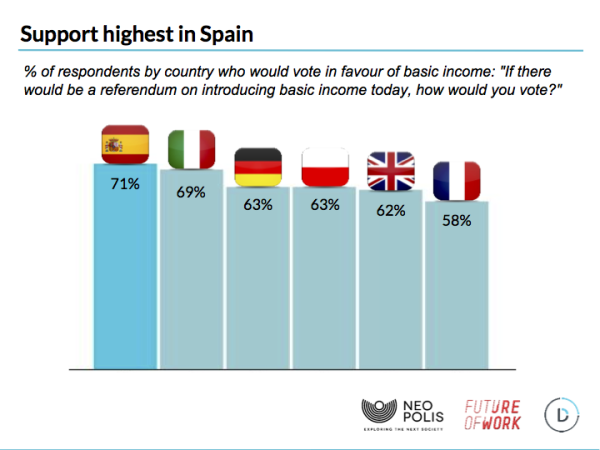64% of Europeans support the idea of unconditional basic income
Only 4% of citizens after the introduction of AML will refuse to work

It remains two weeks before the national referendum on the introduction of unconditional income in Switzerland, but preliminary public opinion polls show that Europeans in general are very favorably perceive this progressive idea.
The first pan-European poll ( results, pdf ) showed that if the referendum were held now, 64% of the inhabitants of the European Union would support the introduction of an unconditional basic income.
The survey was conducted by the Berlin company Dalia Research in the framework of the research program e28TM, which studies public opinion in the EU countries on various topics. Surveys are conducted every six months on a representative sample of 10,000 people in 28 EU countries.
')
The survey also showed that only 17% of residents do not know anything about AML. Every fourth “heard something”, 35% are aware of AML, and 23% say they fully understand the essence and objectives of this program.
The AML in the questionnaire was formulated as “Income, which is paid without conditions by the government to every citizen, regardless of whether he works or not, and regardless of the availability of other sources of income. It replaces social insurance payments and is high enough to cover the basic needs of a person (food, accommodation, etc.). ”
Interestingly, the survey revealed a clear correlation between awareness of the unconditional basic income and support for this idea. That is, the more people know about this economic initiative, the stronger they support it.

The AML idea is most popular in Spain and Italy. With some lagging followed by Germany and Poland.

Respondents were also asked about the pros and cons of unconditional basic income. People consider the most convincing benefits of an AML to be that such social payments “reduce anxiety about basic financial needs” (40%) and help ensure equal opportunities for people (31%). Perhaps, quite surprisingly, the argument of reducing bureaucracy and saving government spending by reducing bureaucratic costs turned out to be the least convincing (16%). Perhaps in Europe, bureaucracy and the cost of civil servants are not as big a problem as in some other countries.
And the most interesting result: only 4% of the population after the introduction of AML will refuse to work and only 7% will reduce the number of working hours. At the same time, thanks to the AML, people plan to spend more time with their families (15%), gain new professional skills (10%) and work more on volunteer projects (7%).

The pan-European survey fully confirms the results of the Swiss poll in January . Even then, it became clear that the absolute majority of citizens after the introduction of AML will continue to work, despite the fact that their basic needs will be met in any case.
In 2015-2016, AML surveys were conducted in France (support 60%), Catalonia (72%) and Finland (67%). Dalia Research results are the first such survey in all EU countries at once.
Source: https://habr.com/ru/post/394257/
All Articles